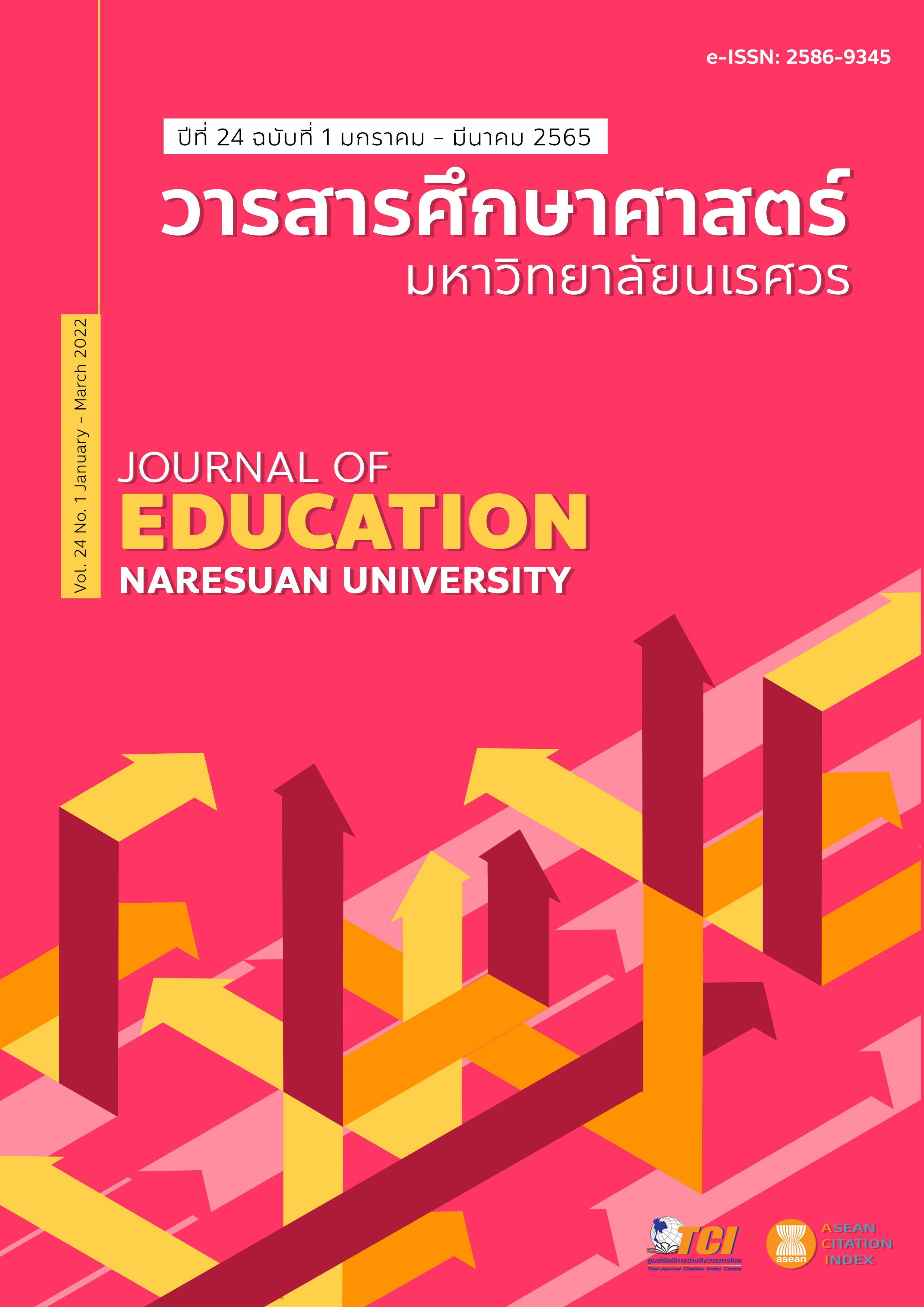GRADE 10 STUDENTS’ LEARNING PROGRESSIONS FOR ECOSYSTEM THROUGH ADAPTIVE INSTRUCTION ความก้าวหน้าในการเรียนรู้แนวคิดเรื่องระบบนิเวศของนักเรียนชั้นมัธยมศึกษาปีที่ 4 ที่เรียนด้วยการจัดการเรียนรู้แบบปรับเหมาะ
Main Article Content
Abstract
The study focuses on eliciting grade 10 students’ learning progressions (LPs) for ‘energy transfer in ecosystem’ and ‘carbon cycle’. LPs is a new perspective for studying how children learn science in science education. LPs views alternative conception as a stepping stone necessary for learners to achieve a higher level of learning. This study explored the changes of learning levels and pathways of 30 tenth graders who studied ‘energy transfer in ecosystem’ and ‘carbon cycle’ through an adaptive instruction. Findings reveal that the majority of students reaches a higher level of conceptual understanding after learning through this pedagogical approach. The students expressed more than one learning pathway for understanding each concept. This study suggests teachers and curriculum developers to organize contents and learning activities in correspondance with learners’ learning pathways.
Article Details

This work is licensed under a Creative Commons Attribution-NonCommercial-NoDerivatives 4.0 International License.
The owner of the article does not copy or violate any of its copyright. If any copyright infringement occurs or prosecution, in any case, the Editorial Board is not involved in all the rights to the owner of the article to be performed.
References
Allen, M. (2015). Preschool children’s taxonomic knowledge of animal species. Journal of Research in Science Teaching, 52(1), 107–134.
Berg, R., Sleegers, P., Femke Geijsel, F., & Vandenberghe, R. (2000). Implementation of an innovation: Meeting the concerns of teachers. Studies in Educational Evaluation, 26, 331-350. DOI:10.1016/S0191-491X(00)00022-5
Corcoran, T., Mosher, F. A., & Rogat, A. (2009). Learning progressions in science: An evidence-based approach to reform. CPRE Research Report # RR-63.
Corcoran, T., & Silander, M. (2009). Instruction in high schools: The evidence and the challenge. The Future of children, 19(1), 157-83. DOI:10.1353/foc.0.0026
Disessa, A. A. (2002). Why “Conceptual Ecology” is a Good Idea. In: Limón M., Mason L. (eds) Reconsidering Conceptual Change: Issues in Theory and Practice. Springer, Dordrecht. https://doi.org/10.1007/0-306-47637-1_2
Duschl, R., Maeng, S., & Sezen, A. (2011). Learning progressions and teaching sequences: A review and analysis. Studies in Science Education, 47(2), 123-182.
Houtveen, T., & Van de Grift, W. (2001). Inclusion and adaptive instruction in elementary education. Journal of Education for Students Placed at Risk, 6(4), 389-409.
Jin, H., Zhan, L., & Anderson, C. W. (2013). Developing a fine-grained learning progression framework for carbon-transforming processes. International Journal of Science Education, 35(10), 1663-1697.
Kemmis, S., & McTaggart. R. (1998). The Action Research Planner. Geelong, Victoria: Deakin University Press.
Ketsing, J. (2019). Science Classroom Action Research: A Learning Pathway for Improving You. Bangkok: Charansanitwong Printing. [in Thai]
Lawson, A. E., Alkhoury, S., Benford, R., Clark, B. R., & Falconer, K. A. (2000). What kinds of scientific concepts exist? Concept construction and intellectual development in college biology. Journal of Research in Science Teaching, 37(9), 996-1018.
Ministry of Education. (2009). National Core Curriculum B.E. 2551. Bangkok: The Agricultural Cooperative Federation of Thailand. [in Thai]
National Research Council. (2007). Taking Science to School: Learning and Teaching Science in Grades K-8. Washington, DC: The National Academies Press.
National Research Council. (2012). A Framework for K-12 Science Education: Practices, Crosscutting Concepts, and Core Ideas. Washington, DC: The National Academies Press.
NGSS Lead States. (2013). Next generation science standards: For states, by states. Washington, DC: The National Academies Press.
Phochana, P., Singlop, S., & Srisanyong, S. (2018). A study of learning achievement, science concepts and attitude towards biology on the topic of structure and flowering plants of Matthayomsuksa 5 students through constructivism theory. Journal of Education Naresuan University, 20(2), 126-139. [in Thai]
Plummer, J. D., & Krajcik, J. (2010). Building a learning progression for celestial motion: Elementary levels from an earth-based perspective. Journal of Research in Science Teaching, 47(7), 768-787.
Posner, G. J., Strike, K. A., Hewson, P. W., & Gertzog, W. A. (1982). Accommodation of a scientific conception: Toward a theory of conceptual change. Science Education, 66(2), 211-227.
Stevens, S. Y., Delgado, C., & Krajcik, J. (2010). Developing a hypothetical multidimensional learning progression for the nature of matter. Journal of Research in Science Teaching, 47(6), 687-715.
Tomlinson, C. A. (2006). An educator’s guide to differentiating instruction. Boston, MA: Houghton Mifflin.
Treagust, D. F., & Duit, R. (2009). Multiple perspectives of conceptual change in science and the challenges ahead. Journal of Science and Mathematics Education in Southeast Asia, 32(2), 89-104.
Vygotsky, L. S. (1978). Mind in Society. Cambridge, Mass.: Harvard University Press.
Waxman, H. C., Alford, B. L., & Brown, D. (2013). Internalized instruction. In J. Hattie & E. M. Anderman (Eds.). International Guide to Student Achievement. New York, NY: Routledge.


